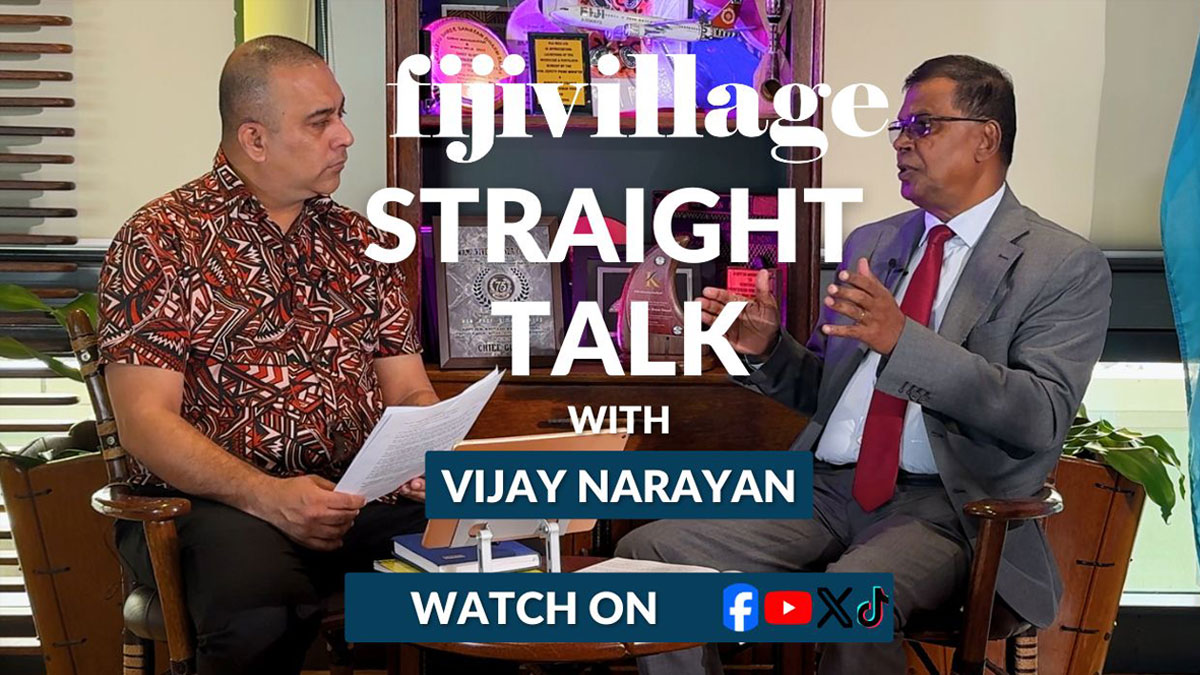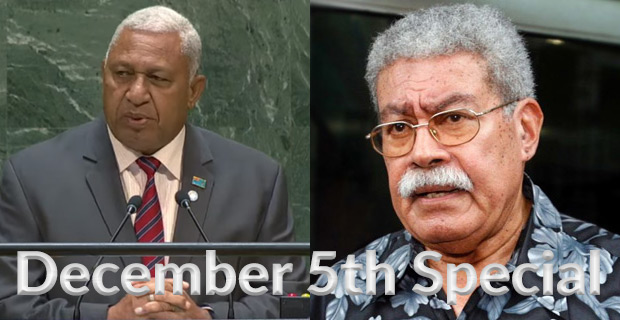
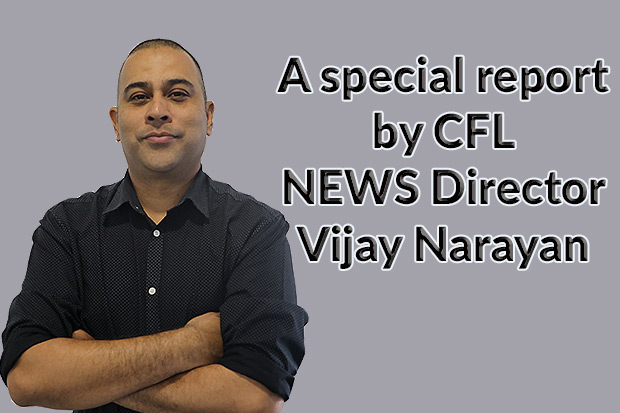
A special report done on December 5th, 2007, one year after the coup
Listen HERE for the full Special Report on the December 5th, 2006 coup

December 5th, 2006 - after months of threats and differences, the speculation was put to rest and the Qarase led government was overthrown by the military.
What were the reasons for the differences and the cause of the events? These issues are still being disputed to date.
One year on, Qarase's case against the military is before the courts where the ousted PM is saying that the takeover was illegal while the military has said that it was a cleanup campaign and it had to be carried out due to a number of proposed racist legislations, a high level of corruption, an alleged threat of foreign intervention and the President's decision to get rid of the government led by Qarase due to alleged illegal and unconstitutional decisions made by the then PM.
And as we mark the day today, we look back at the events leading up to the December 5th takeover or the cleanup campaign - we look at significant events that may have contributed to the actions taken by the leaders of the country and whether the takeover could have been avoided.
*******
Tuesday, lunchtime October 31st, 2006 - note this time and date as this is an important moment in Fiji's history as on this day, the then Prime Minister, Laisenia Qarase went to Government House to ask the President and Commander-in-Chief, Ratu Josefa Iloilo to remove the Army Commander, Commodore Frank Bainimarama.

The war of words between Qarase and Bainimarama was ongoing from 2002 to 2006 starting from when there were plans to relook at the Commander's contract, then to the controversial Reconciliation Bill which amongst other things would have legislated the granting of amnesty to the coup convicts or perpetrators of the events of May and November 2000 and the granting of extramural sentences and CSO's to people convicted in relation to the 2000 coup and mutiny. The relationship between the two leaders worsened when Qarase made statements before the 2006 elections that Fiji was not ready for an Indian Prime Minister, and following the election, the SDL led multi-party government's plan to bring in the Qoliqoli and Indigenous Land Claims Tribunal bills.
Throughout these four years, the impasse continued with no resolution in sight. But on October 31st, Qarase took action, he went to the President and asked him to remove Bainimarama and appoint Colonel Ratu Meli Saubulinayau as Acting Commander. This action was taken after Bainimarama issued a three week ultimatum on October 16th, 2006 for the government to meet nine demands or resign - the demands were that all those involved in the 2000 coup are brought to justice, withdraw any political mechanisms which would potentially further economic inequality based on racial grounds, remove everyone in the government who was involved in the May 2000 coup or mutiny, drop any investigations in relation to the military's statements and formally address concerns about government spending and internal governance.
No statements were made on October 31st, 2006 but it was clear that a group of senior officers went to the President and requested him to wait for the Commander to return from Iraq before making any decisions to remove him from office. The President agreed and Qarase's request was turned down.
Major Neumi Leweni on October 31st, 2006 –
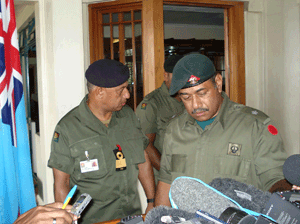
On November 1st, 2006, Qarase did not say anything on the plan to remove Bainimarama when he addressed the nation. He stressed that the military falls under the elected government of the day and the RFMF's interpretation that it is the last bastion for law and order in Fiji was incorrect.
He also said that he had advised the then Fijian Affairs Minister, Ratu Naiqama Lalabalavu to arrange for an urgent Great Council of Chiefs meeting as the GCC has a reservoir of wisdom and will be able to resolve the crisis.
On the same day, on November 1st 2006, the RFMF removed seven tonnes of army ammunition from the Suva Wharf. Police Commissioner, Andrew Hughes said that the ammunition was removed without his approval.
But the military spokesperson, Major Neumi Leweni disputed Hughes statement
While all this was unfolding, Commodore Bainimarama was away in Iraq.
Speaking from abroad on November 2nd, 2006, Bainimarama made it clear that he would only talk to the Qarase government if Qarase dumps the controversial proposed legislation and those involved in the events of 2000 are removed from the government.
By this time the Australian and NZ governments were treating the threat of a coup seriously. They issued travel warnings to their citizens not to travel to Fiji.
Australian Prime Minister, John Howard also revealed in Canberra that he spoke to Qarase about the matter.
Two Australian navy ships were also placed on stand-by just outside the Fiji waters from November 1st, 2006. This confirmation from Air Chief Marshall Angus Houston:
Tension was set to rise as Bainimarama was expected back into the country within days.
*******
A few days later, Bainimarama returned and said that the Qarase government was continuing to misread the military and Qarase's interpretation that the RFMF was just hungry for power, was incorrect.
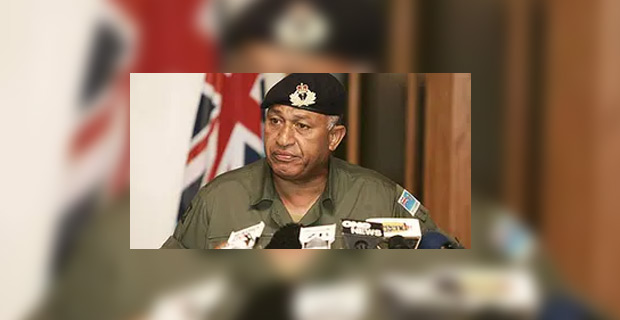
No resolution was in sight as we approached the end of November as Qarase maintained that his government was democratically elected and the military should not interfere in the running of the country and the Commander should understand that the military falls under the elected government, while Bainimarama maintained that the Qarase government needs to make the changes or a cleanup campaign would be carried out.
On the 28th of November, 2006, there was some hope as Fiji Village News broke the news that Qarase will meet the Army Commander in NZ on the following day. Qarase confirmed that a meeting between him and Bainimarama was finally arranged by the NZ Prime Minister, Helen Clark and Foreign Minister, Winston Peters.
Bainimarama was already in Wellington, to attend his granddaughter's christening and had confirmed that he would attend the meeting.
Qarase left on a special NZ Air Force flight at about midday to NZ hoping that things are sorted out in the Land of the Long White Cloud.
But just hours before the meeting, as Qarase arrived in NZ, Bainimarama announced that Qarase has to give into all his demands in the meeting in Wellington.
But NZ Prime Minister, Helen Clark said on November 28th that she was hoping that good sense would prevail and everything would be resolved in NZ on the following day
*******
November 29th, 2006 - All eyes were on NZ for the scheduled meeting between Bainimarama and Qarase.

The meeting in Wellington started at 9am. Qarase and Bainimarama met in the presence of NZ Foreign Minister, Winston Peters. The Commander wanted the Reconciliation Bill, Qoliqoli Bill and Indigenous Land Claims Tribunal Bill dropped, Police Commissioner Andrew Hughes to be removed, declare that the 2000 coup was wrong and unlawful, remove all those people from government who were allegedly involved in the May 2000 coup, the Police Tactical Response Team to be disarmed and all investigations against the Commander and senior officers of the RFMF to be dropped.
There was suspicion in the air on why Police Commissioner, Andrew Hughes accompanied Qarase to NZ. The military also questioned why senior police officers, Kevueli Bulamainaivalu and Waisea Tabakau had gone to NZ just days before that. It has been established that there were moves afoot to try to get New Zealand's assistance to arrest the Commander in Wellington. However, the request was rejected.
Following the meeting, Qarase said that they made some progress in their talks and hoped that good sense would prevail.
He also said that the meeting had to be cut short as Bainimarama had to catch a flight back to Fiji.
But NZ Foreign Minister, Winston Peters offered to facilitate further meetings between the two leaders.
Meanwhile, Hughes did not come back to Fiji and it was revealed on November 29th, 2006 that the Police Commissioner had taken some leave and had gone to his home in Australia.
*******
November 30th, 2006, Prime Minister, Laisenia Qarase addressed the nation at 4pm, after returning from NZ, saying that his government will undertake a major public awareness campaign to educate the people of Fiji that the 2000 coup and mutiny was wrong and unlawful. Qarase announced that the government will suspend the Qoliqoli, Reconciliation and Land Claims Tribunal bills.
He also confirmed that the government will readily accept the decision of the Office of the DPP and the police with regards to the investigations underway against the Commander and his senior officers should they decide not to proceed further in the greater interest of peace and stability in Fiji. Qarase also said that he promised the Commander in NZ that they will hasten the consideration of draft legislation on leadership conduct, freedom of information and the establishment of an anti-corruption agency.
The then Prime Minister also revealed that the status of Police Commissioner Andrew Hughes contract which was coming to an end will also be reviewed based on the concerns raised by the RFMF.
But any sense of a crisis averted did not last long.
In his press conference at about 6pm November 30th, Bainimarama declared that the talks with Qarase had failed in NZ and wanted all his demands met by midday December 1st, 2006, without any exception
Friday December 1st arrived. Many thought that a coup was imminent with the military's deadline for Qarase to expire at midday. But the only place where the soldiers and police clashed on that day was in the annual Sukuna Bowl Challenge match.

Bainimarama arrived at the Post Fiji Stadium to watch the match, soon after his deadline had expired. He joked about a coup when journalists questioned him about the deadline.
It was also confirmed that Bainimarama went to Government House earlier that morning to meet President, Ratu Josefa Iloilo.
But on the same day, the Prime Minister of the country, Laisenia Qarase was nowhere to be found. Early in the morning, Fijivillage News received information that Qarase and his cabinet ministers had decided to go into hiding as the Commander's deadline approached. Qarase went up to Vanua Levu with his bodyguards and stayed there waiting for the deadline to expire.
Fijivillage News managed to contact him at about 4pm and he confirmed that the Vice President, Ratu Joni Madraiwiwi wanted to have a meeting with him but he told the President's office that it was not possible for him to attend the meeting.
Qarase only said that he was somewhere in Fiji and his government was following a strategic plan to counter the military's next step.
Saturday December 2nd, Qarase returned to Suva and in a national address he said that he was still in control of the government and also said that he had received information that Commodore Bainimarama had extended the deadline to midday December 4th.
But Bainimarama announced at about 4pm on the same day that he had not extended the deadline and Qarase was misleading the people.
Bainimarama also refused to reveal when the military's cleanup campaign will be initiated.
On Sunday December 3rd, 2006, Qarase revealed to the nation that he had decided to convene a special cabinet meeting on Tuesday, December 5th to decide on the next step following the demands of the military. Qarase met with members of the National Security Council, minus the military, and decided to convene the meeting because he said that the Commander keeps changing his demands.
He also revealed that it would be business as usual for him on Monday and he would be out of Suva attending the Naitasiri Provincial Council meeting.
December 4th, 2006, it was now getting clear that the military's cleanup operation had started. At about 10am soldiers arrived at the Police Tactical Response Unit Headquarters and wanted to check the PTR armoury.
Acting Police Commissioner, Moses Driver stressed that no orders were received by the police to open up the armoury. Police officers at the PTR headquarters in Narere tried to lock up the main gates to stop the soldiers. However, the soldiers managed to move in and later got the keys of the armoury and started loading the firearms into a truck.
Driver remained adamant that there was nothing wrong and the military was just awaiting the necessary approvals from the Home Affairs Minister, Josefa Vosanibola before viewing the police firearms.
As the day progressed, soldiers also arrived at the Nasova, Tavua, Ba, Lautoka and Labasa armouries removing all the arms and ammunition in the Police Force's possession.
At about 1pm on the same day, soldiers set up a checkpoint in Sawani and it was revealed that they were waiting for Qarase's motorcade to arrive from Viria where he went to attend the Naitasiri Provincial Council meeting.
Qarase's bodyguards received word on the military checkpoint. A helicopter was then arranged, former senior military officer, Lieutenant Colonel Jone Baledrokadroka assisting Qarase, to ensure that he arrives safely in Suva. Qarase and his wife Leba touched down in a helicopter at Albert Park at about 5 o’clock on that afternoon. They were then picked up by a rental car and taken straight to their home at Richards Road.
As expected the Prime Minister's motorcade was stopped in Sawani by armed soldiers. All of Qarase's bodyguards were then disarmed and allowed to pass through the checkpoint.
Fijivillage News also received confirmation that the Prime Minister, Laisenia Qarase could not have a meeting with President Ratu Josefa Iloilo scheduled for about 7pm on December 4th after armed soldiers told Qarase to get off his vehicle at the Government House gate and walk to the President's office.
Qarase said that he did not want to give in to the military's intimidating tactics and decided to return home.
Many army checkpoints were then erected around the country with armed soldiers standing guard. The Army Commander called a press conference and said that the military had taken the firearms from the police armouries to ensure that some dissidents do not use the weapons against the RFMF and the people of Fiji.
7am December 5th, 2006.
The day started with Laisenia Qarase confirming that he will meet President, Ratu Josefa Iloilo at 9am on that day and he also confirmed that he will go ahead with his special cabinet meeting to discuss the Commander's demands.
Soon after this revelation, it was confirmed that soldiers had started seizing the official vehicles of all the government ministers. Vehicles parked at the Government Buildings were seized first. By 9am on December 5th, 2006, the military confirmed that they were in the process of seizing all the government vehicles of the ministers. It was also confirmed by the cabinet secretariat that the special cabinet meeting was postponed to maybe later in the afternoon. Qarase did not show up at the PM's Office at the Government Buildings that morning.
Then at about 11am, armed soldiers arrived at the official residence of the Prime Minister. Qarase was having a meeting with Finance Minister, Ratu Jone Kubuabola, Home Affairs Minister, Josefa Vosanibola and Attorney General Qoriniasi Bale at the PM's residence at Richards Road.
The soldiers tried to get in but Qarase's bodyguards formed a human shield at the gates. After some negotiation, the soldiers left the PM's residence after they were handed a bunch of keys. The soldiers returned about 20 minutes later to take the PM's official vehicle.
At midday December 5th, 2006, we received confirmation that President, Ratu Josefa Iloilo wanted Laisenia Qarase to give into all of the military's demands or resign from his post.
In an interview from his home, Qarase told Fijivillage News that he was not sure whether he was still the Prime Minister of the country.
Qarase also confirmed that roadblocks were erected by the military and he was inside his house with his family.
It was also confirmed that the President met with Commodore Bainimarama at about 11am on December 5th. It was also confirmed by Military spokesperson, Major Neumi Leweni that the Commander would address the nation at 6pm.
And then at 6pm December 5th, 2006, the step was taken. It had been threatening for weeks and it was declared by Commodore Bainimarama - the Qarase government was removed.
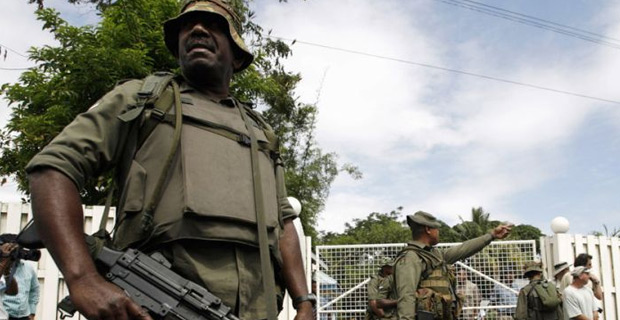
Doctor Jona Senilagakali was appointed as the Caretaker Prime Minister. But speaking outside his home on the evening of December 5th, Qarase said the military's actions were unlawful.
On the same evening, Australian Prime Minister, John Howard confirmed to ABC News that Qarase had asked for military intervention to ensure that the RFMF's efforts to take over his government fails.
According to Howard, it was the third plea from Qarase which he outrightly rejected.
However, both NZ and Australia came out strongly criticizing the military's actions and placing travel sanctions on anyone involved with the military.
One year on, a lot has happened. An interim government was appointed in January this year, travel sanctions placed on the administration continue, FICAC has been established, a number of changes have been made to the government structure and in the past few months, confirmation has come through that the next elections will be held in March 2009. A National Council for Building a Better Fiji will now look at ways to take the country to ensure that we have a united Fiji with people having equal opportunities for all irrespective of race and religion. But a lot of people who have been taken out of the positions are still stressing that the decisions being taken by the interim administration and the military are unlawful, while Qarase is still trying to have a one on one meeting with Bainimarama.
They even say that the military's actions were uncalled for when people who spoke out against the RFMF were taken to the army barracks.
The RFMF has maintained that people should take their complaints to the Human Rights Commission or the police if they feel that their rights have been abused. The military also stressed that any threat to national security will not be entertained.
The legality or otherwise of the events of December 5th, 2006 will be determined by the courts next year.
However, the questions that people are now asking is - What is Fiji's future? What is the best way forward? Do we now need to pave a new pathway forward for Fiji or do we just leave things as they are and wait for March 2009 for the elections? All these questions will definitely be answered in due course. Only time will tell when this will occur and how things will shape up.
Listen BELOW for the full audio of the December 5th 2007 talkback with Vijay Narayan on Legend FM
Stay tuned for the latest news on our radio stations

